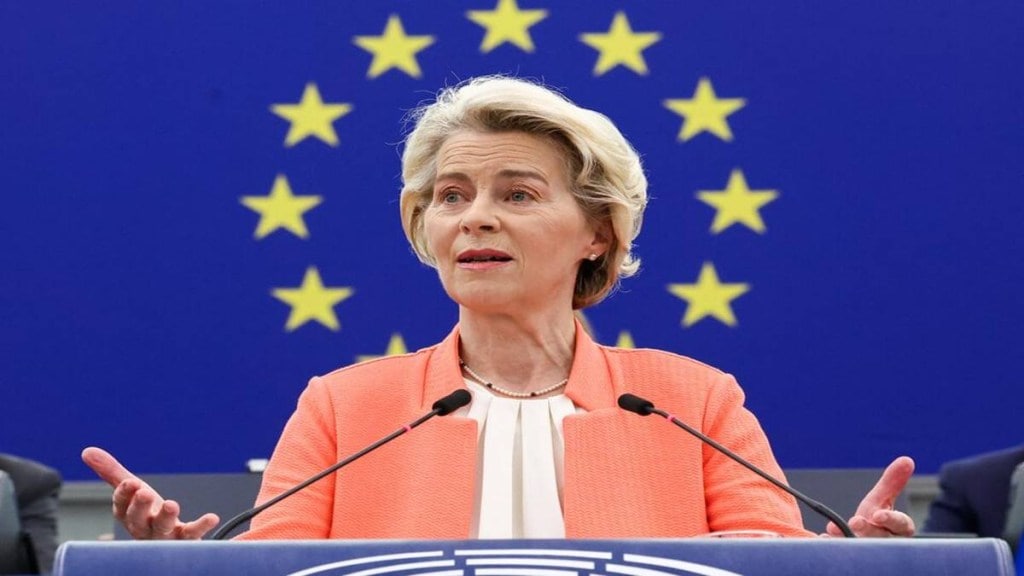A high-level delegation of the European Union (EU) College of Commissioners, led by European Commission President Ursula von der Leyen, is arriving later today. This will be the first time that such a huge delegation from the EU will visit India. Of the 27 Commissioners, 22 will be participating in this two day visit (Feb 27-28), marking an important step in the evolving strategic partnership between India and the EU.
A Milestone for India-EU Relations
This visit comes at a critical moment for India-EU relations, as both sides enter the third decade of their Strategic Partnership. The delegation’s visit is designed to deepen and diversify cooperation across multiple sectors, paving the way for more robust engagements in trade, technology, defence, clean energy, and digital innovation. The visit holds symbolic and practical significance as it sets the stage for strengthening ties at both the governmental and institutional levels.
Trade and Investment: A Key Focus
Trade and investment will be central to discussions between the EU and Indian leaders. The EU has been India’s largest trading partner in goods, with bilateral trade reaching $135 billion in 2023-24. Trade in services also saw an all-time high of $53 billion in the same year.
As both sides look to enhance these economic engagements, a key highlight will be the second Ministerial meeting of the Trade and Technology Council (TTC). This will follow the first session held in Brussels in 2023 and will cover critical areas such as digital technologies, green energy, and resilient supply chains.
The EU’s strong investment presence in India, with over $117 billion in Foreign Direct Investment (FDI) since 2000, is also an area of strategic importance. India is similarly increasing its investments in the EU, contributing to the mutual economic growth and job creation across both regions.
Technology and Innovation: Enhancing Cooperation
Technological cooperation has been a significant aspect of India-EU relations. The delegation will focus on expanding collaboration in digital technologies, artificial intelligence, high-performance computing (HPC), and quantum technologies. India and the EU have already signed several memorandums of understanding, including on semiconductor R&D and HPC cooperation, which are expected to bear fruit in tackling the global technology challenges of tomorrow.
Furthermore, both sides have continued to build on the momentum from recent collaborations, such as India’s Digital Public Infrastructure (DPI) initiatives, and discussions will continue around innovative technologies like AI, data governance, and cybersecurity.
Energy and Sustainability: A Green Partnership
Energy cooperation, particularly in the area of clean energy, has seen considerable progress over the past few years. India and the EU have developed joint efforts in green hydrogen, renewable energy, and sustainable energy systems. A major area of focus will be the Green Hydrogen partnership, with the EU supporting India’s ambitions to build a green hydrogen ecosystem, demonstrated by the European Investment Bank’s commitment to fund Indian hydrogen projects.
India’s renewable energy sector is growing rapidly, and the EU’s involvement in initiatives such as the International Solar Alliance (ISA) and offshore wind energy projects reflects a shared commitment to a sustainable energy future. This visit will provide further momentum to these collaborations, with both sides prioritizing the fight against climate change and the development of sustainable energy solutions.
Defence and Security Cooperation
The EU-India defense relationship has evolved significantly in recent years, with both sides focusing on maritime security and counterterrorism efforts. The first-ever joint naval exercises in the Gulf of Aden in 2021 and more recent collaborations in the Gulf of Guinea demonstrate a shared commitment to maintaining global security.
The visit will further enhance defence cooperation, particularly in areas related to space security, regional stability, and counter-piracy efforts. The partnership also encompasses broader security challenges, including cyber threats and the protection of critical infrastructure.
People-to-People Ties
The Indian diaspora in Europe plays a key role in bridging the cultural divide, contributing significantly to European economies, particularly in sectors like IT, healthcare, and engineering.
Education and research collaborations between India and the EU also remain robust. Indian students and researchers are increasingly present in European universities, benefiting from programs such as Erasmus scholarships and the Marie Skłodowska-Curie Actions.

